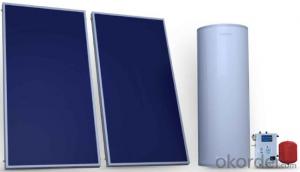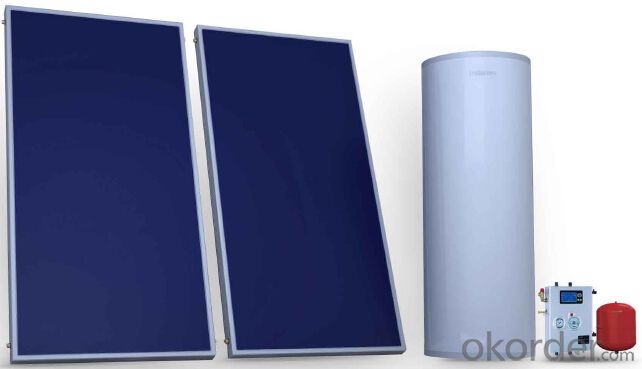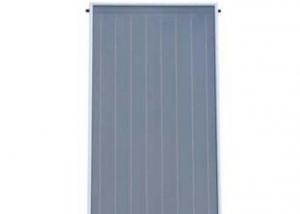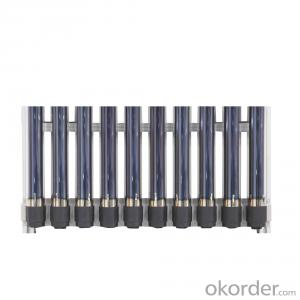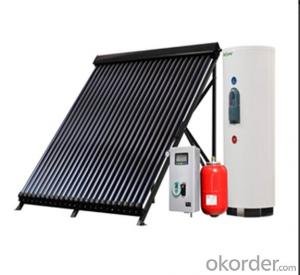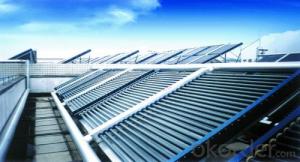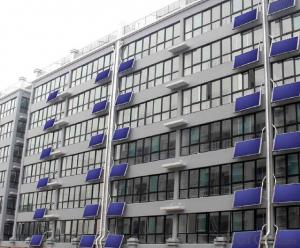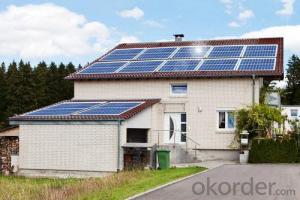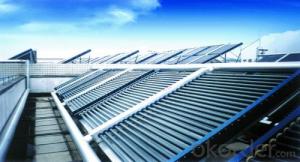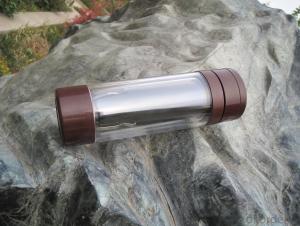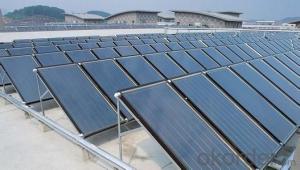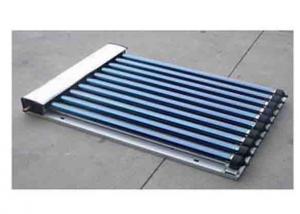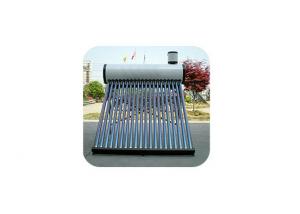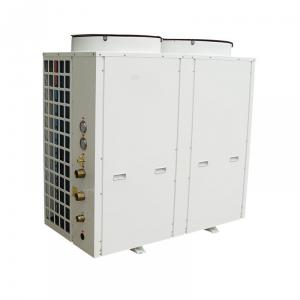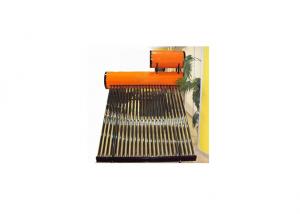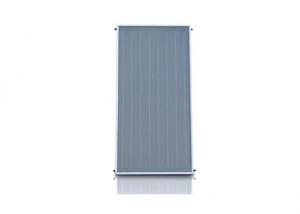Solar Water Heater for Home - Split Solar Water Heating System (Standard)
- Loading Port:
- Tianjin
- Payment Terms:
- TT OR LC
- Min Order Qty:
- 1 set
- Supply Capability:
- 50 set/month
OKorder Service Pledge
OKorder Financial Service
You Might Also Like
1. Structure of Split Solar Water Heating System(Standard)
Our Split Solar Water Heating System has two versions: standard and luxury. Compared to compact type solar water heating system, split solar water heating system can offer enough water for need and manage to supply hot water to divers spots like in kitchen, bathroom and so on. Then split solar water heating system can be installed in the balcony, on the wall or rooftop, which can avoid the difficulty of installation on high building. Split solar water heating system is a kind of synthetical energy saving system, suitable for different kinds of architectural style, and as a technology indenpendent to urban energy saving requirment, it is ideal supporting facilities for real estate developpment. Morever, we have obtained produts certificate as follows:

2. Main Features of Split Solar Water Heating System(Standard)
large wter tank to ensure enough water supply
adopt multiple modularized insulation technoloty
seamless integration with modern architecture
split water compression system and induced force circulations to increase heat exchange rate
3. Split Solar Water Heating System (Standard) Images
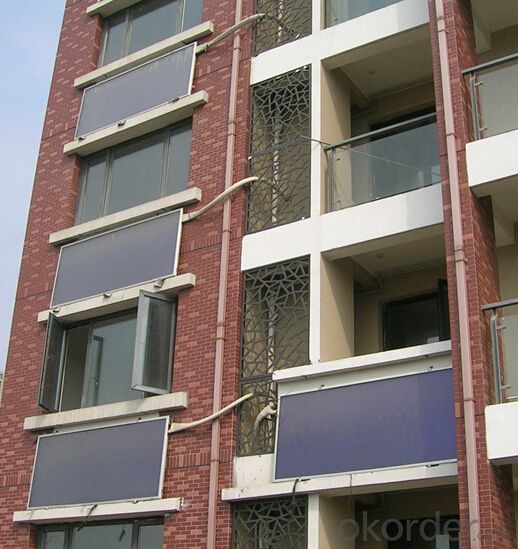
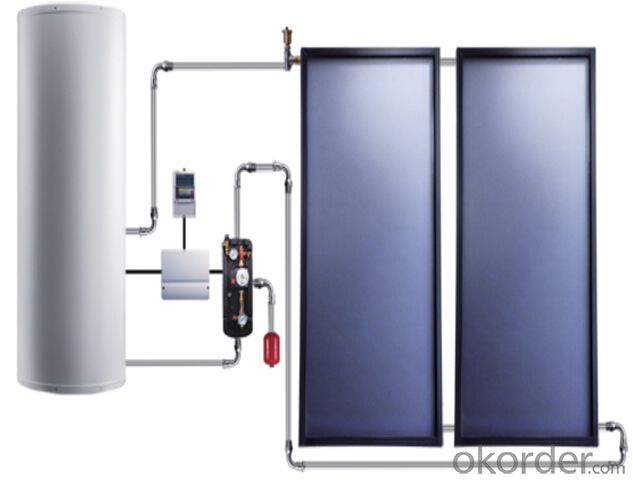
4. Split Solar Water Heating System (Standard) Specification
| Model | Volume(L) | Tank Dimension(mm) | Solar Collector Model | Collecting Area (m2) | Gadget |
| PJF-2-200-2 | 200 | φ520×1517 | P-G/0.6-L/LT-1.8-201 | 4 | pressure expansion tank, controller, water pump |
| PJF-2-270-2 | 270 | φ620×1397 | P-G/0.6-L/LT-1.8-201 | 4 | pressure expansion tank, controller, water pump |
5. FAQ
(1) Do you have operation and installation manual for guide?
Yes, we have booklet with the products in the package. If you still have problems, you can email us for help.
(2)Can the prducts be modified?
Yes, the products can be modified according to specific requirement , and we would like to suggest you contacting with our technicist for more details.
(3) How long can the customer get the goods?
Honestly speaking, it depends on the quantity of your order, the way of delivery and other factors that concerns about it. But if your purchase for a large amount, it is possible to give the customer some discount in price.
- Q: Can a solar water heater be used in areas with high levels of salt in the air?
- Yes, a solar water heater can be used in areas with high levels of salt in the air. However, regular maintenance and cleaning may be required to prevent the build-up of salt deposits on the solar panels, which can reduce its efficiency.
- Q: Solar water heater hot water pipe why burst
- Hot water pipe burst of solar water heater:1, solar water tank without water, vacuum tube temperature during the day is higher, if the water at this time, due to the temperature difference is too large tube, the most likely.
- Q: Are there any safety considerations for installing a solar water heater?
- Yes, there are several safety considerations to keep in mind when installing a solar water heater. Firstly, it is important to ensure that the system is properly installed by a qualified professional to minimize the risk of any electrical or structural issues. This includes following all building codes and regulations. Secondly, it is crucial to take precautions to prevent overheating. Solar water heaters can reach high temperatures, and if not properly regulated, it can lead to scalding or even explosion of the storage tank. Installing a temperature and pressure relief valve is essential to prevent such incidents. Additionally, it is important to consider the weight and stability of the solar water heater system. The storage tank and collector panels can be heavy, so it is crucial to ensure that the roof or supporting structure can handle the weight. Proper anchoring and bracing should be used to prevent any accidents or damage due to strong winds or earthquakes. Moreover, it is important to practice regular maintenance and inspections to keep the system in good working condition. This includes checking for any leaks, ensuring proper insulation, and cleaning the collector panels regularly to maximize efficiency and prevent any hazards. Finally, it is crucial to adhere to all manufacturer's instructions and guidelines when installing and operating a solar water heater. This ensures that the system functions properly and safely, reducing the risk of any accidents or injuries. In summary, safety considerations for installing a solar water heater include proper installation, preventing overheating, ensuring structural stability, regular maintenance, and following manufacturer's instructions. By addressing these safety considerations, homeowners can enjoy the benefits of a solar water heater while minimizing any potential risks.
- Q: What is the principle of wall mounted solar energy?
- 1 working principle of flat plate collectorThe hot water system is fin flat plate collector which will absorb solar radiation into heat energy, the heat collector tube and the refrigerant temperature rising, the hydrothermal features of low density, cold liquid density, through the circulation line, the formation of cold water at the top between the heat collector and the water tank, hot water from the natural circulation. Through this cycle, so that the water tank gradually warming. Since the working fluid in the flat plate collector is a low temperature resistant liquid, it can be kept at 40 degrees below zero. So even if the cold area, the normal operation of the year.
- Q: LZ solar water heater for several years, dawn, before using normal. A week before the start occasionally "drop" sound twice, that is the water level controller on the control will suddenly jumped into the water from full of water, with water ring twice again. Last weekend, the weekend is not at home, go home and found that he did not know when to start Sheung Shui, turn off the water after the water show, a few minutes to find out the water ran out of hot water. Immediately Sheung Shui, and now occasionally show that the normal water level, usually only show water, can not see the water situation. Asked the manufacturers that the controller and sensor is broken, the replacement to 380...... When LZ bought it, it was more than 1 thousand.Would like to ask what is the problem, 380 of the price is reasonable, the water heater sometimes secretly water, will cause waste, how should we deal with?
- The water temperature and water level sensor is broken, or the sensor is too thick, the replacement of the sensor can beI hope you can help.
- Q: Can a solar water heater be used in areas with high levels of urban shading?
- Solar water heaters rely on direct sunlight to function efficiently. Therefore, in areas with high levels of urban shading, the performance of a solar water heater may be significantly reduced. The presence of buildings, trees, or other structures that cast shadows on the solar panels can hinder the absorption of sunlight, resulting in decreased heating capacity. Consequently, it is generally recommended to install solar water heaters in areas with ample sunlight and minimal shading for optimal performance.
- Q: Are there any specific requirements for installing a solar water heater in a historic building?
- Yes, there may be specific requirements for installing a solar water heater in a historic building. These requirements can vary depending on the regulations and guidelines set by local historic preservation boards or organizations. It is important to consult with these authorities to ensure that the installation does not compromise the historic integrity of the building and adheres to any specific guidelines or restrictions in place for such installations.
- Q: What is an active solar water heater?
- An active solar water heater is a system that uses solar energy to heat water for domestic use. It typically consists of solar collectors, a pump or circulation system, and a storage tank. The solar collectors absorb sunlight and transfer the heat to the water circulating through them. The pump or circulation system ensures that the water flows efficiently, while the storage tank stores the heated water for later use. Overall, an active solar water heater actively utilizes solar energy to provide hot water for various purposes.
- Q: Can a solar water heater be used for swimming pool heating?
- Yes, a solar water heater can be used for swimming pool heating. Solar water heaters work by collecting energy from the sun and using it to heat water. This heated water can then be circulated through the swimming pool, raising its temperature. Solar water heaters are an environmentally friendly and cost-effective way to heat swimming pools, as they utilize renewable energy from the sun. They can be particularly effective in warmer climates where there is ample sunlight throughout the year. However, in colder climates or during winter months, a solar water heater may not be sufficient to heat the pool to the desired temperature. In such cases, a backup heating system may be required. Overall, a solar water heater can be a great option for swimming pool heating, providing an energy-efficient and sustainable solution.
- Q: Can a solar water heater be installed in a mobile home?
- Yes, a solar water heater can be installed in a mobile home. Solar water heaters are versatile and can be installed on the roof or in the yard of a mobile home. They use energy from the sun to heat water, making them an eco-friendly and cost-effective option for mobile home owners.
Send your message to us
Solar Water Heater for Home - Split Solar Water Heating System (Standard)
- Loading Port:
- Tianjin
- Payment Terms:
- TT OR LC
- Min Order Qty:
- 1 set
- Supply Capability:
- 50 set/month
OKorder Service Pledge
OKorder Financial Service
Similar products
Hot products
Hot Searches
Related keywords
